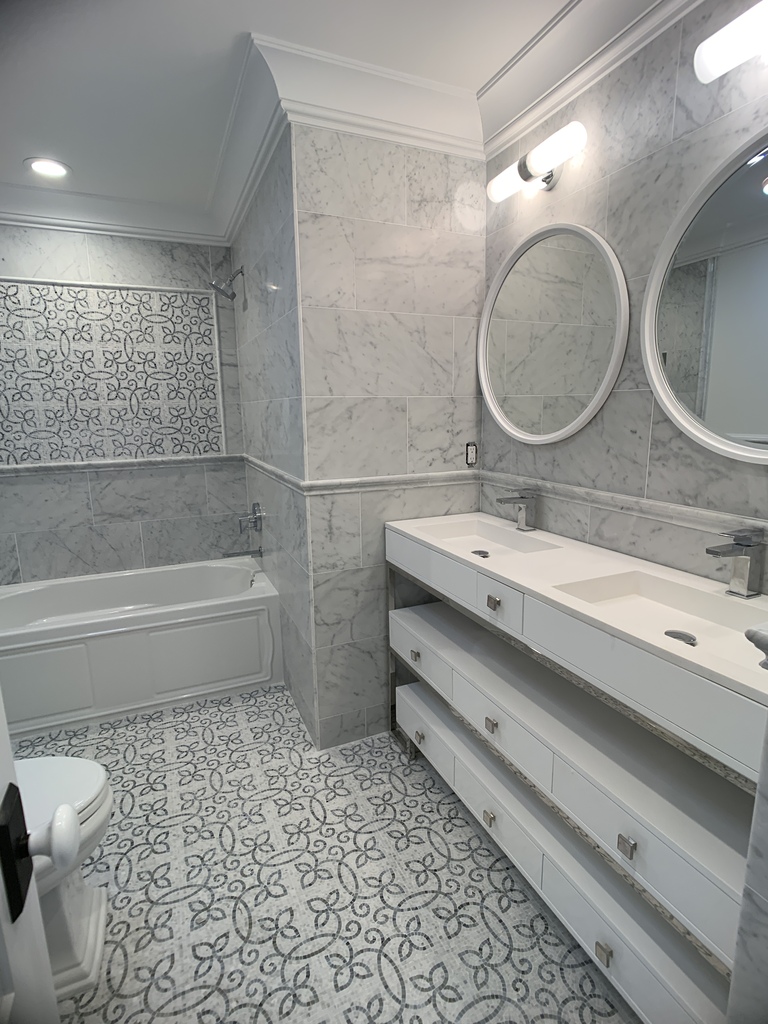When it comes to natural stone tile, you want to be sure to preserve its beauty for years to come! Failure to regularly seal stone can lead to permanent staining or damage. Here at LMP Home, we want to ensure you have the information to properly care for your natural stone, so it continues to shine for a lifetime!

What is Stone Sealer?
Sealers are made to seal stone tight against elements such as chemicals, dyes, water and other contaminants that may meet the surface. Sealing tile not only prevents surface staining, but it also protects against acid erosion and bacteria growth. Some sealers can even add a layer of slip resistance to floors, depending on the brand, see Build Direct’s article for more information.
Should I Seal My Stone?
Yes! All stone and tile products benefit from being sealed. Due to their porous nature, natural stone should be sealed using a high quality penetrating sealer. A penetrating sealer, as the name implies, sinks deep inside the stone’s pores to actively repel water and to also prevent surface staining, while still allowing vapors to escape. Once a stain has been embedded in unsealed natural stone, it can be close to impossible to remove. Instead, it’s much easier to protect the material from the beginning!

How Often Should I Seal My Tile?
Maintaining the surface of your natural stone is very important, as ongoing care will ensure its lasting beauty. Tiles should initially be sealed prior to installation, and again after installation (when the grout is fully cured - about 3 days). Applying sealer before installation will protect the surface from any misplaced mortar or grout that may meet the surface when installing, which can otherwise be highly stainable and extremely difficult to remove. *Tiles should then be resealed regularly as needed.*
Why Seal Regularly?
It’s very important to regularly reseal natural stone in order to keep the look and durability. According to Rogue Engineer, a good rule of thumb is to reseal higher traffic areas (like floors) yearly, and less touched areas (ex. tiled walls) biyearly. However, some stone surfaces are more porous than others and may require sealant more often. It’s a good idea to keep an eye on surfaces for spots that may be absorbing water so you don’t run into staining or corrosion overtime.
The best way to check if your tiles need to be resealed is to apply water to the surface of the tile. If droplets form and roll around, the surface is still sealed. If the water soaks in, it’s time to reseal!
*If you’re unsure about how often to reseal your natural stone, it is always a great idea to reach out to your sealant manufacturer for specific guidelines!*

Will Sealer change the look of my tile?
Natural penetrating sealers neither darken the stone nor alter the color or sheen in any way. They are meant to protect the stone’s surface while highlighting its natural beauty!
However, it is still good practice to wipe up any spills or standing liquids left on the surface of your stone tile, and not allow them to sit for too long. Even with proper sealant application, there is always a chance that the surface will not be fully protected - and as stated earlier, it’s always better to protect the material from the beginning rather than try to fix it later!
How Do I Reapply Sealer?
The process is simple. Just be sure to start by fully cleaning the surface using a natural stone cleaner. Avoid using harsh cleaners on your natural stone, as they could quickly cause damage to the stone! Once the surface has been cleaned, sealant can easily be applied using a sponge or rag.
We at LMP Home hope you were able to learn a bit more about caring for your natural stone through this article! If you have any questions about stone or the sealing process, do not hesitate to reach out. Please send us a message and we will connect with you as soon as possible.
Works Cited
https://www.stoneworld.com/articles/83880-sealing-...
https://www.builddirect.com/learning-center/floori...

